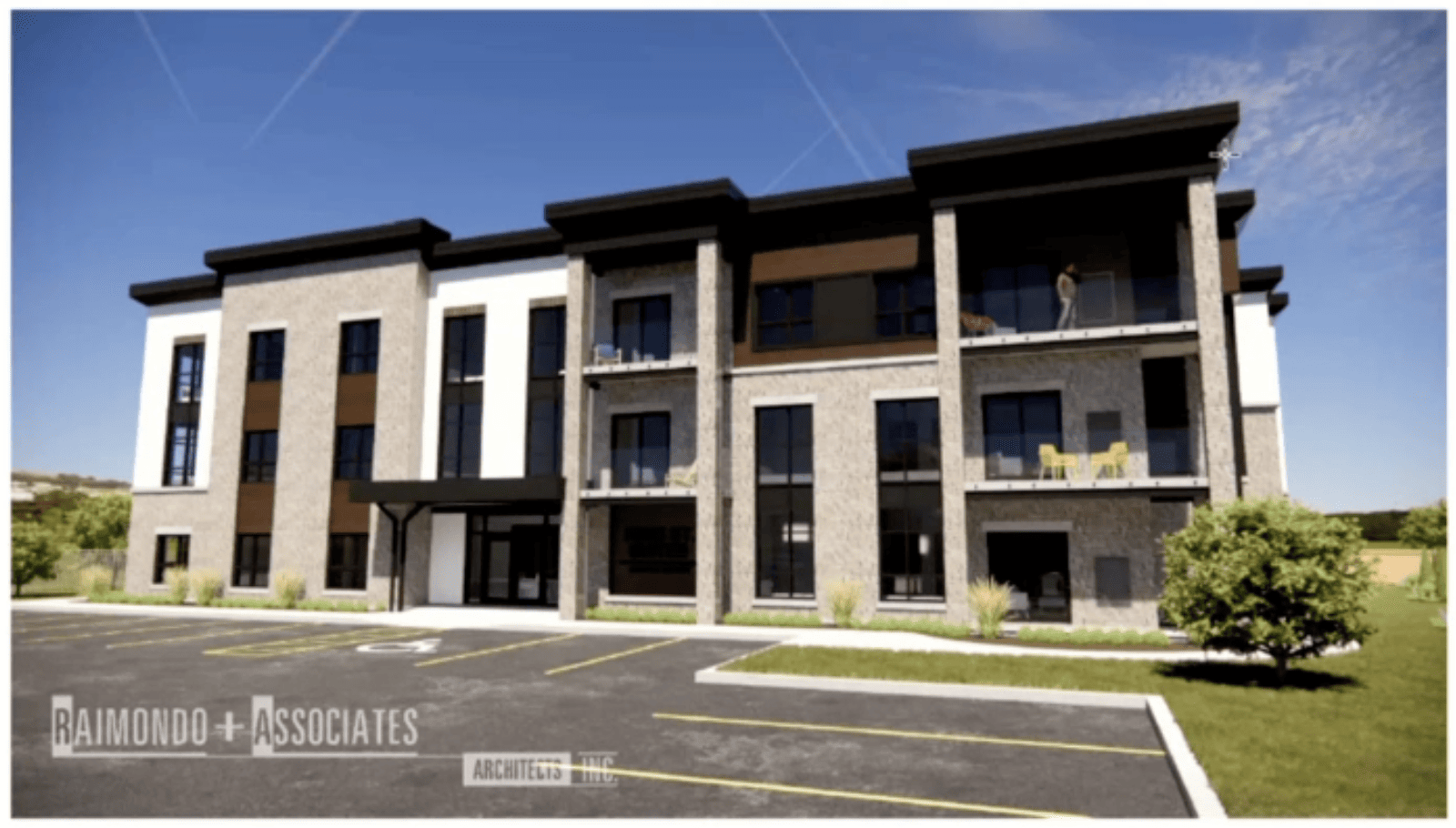The future of a contentious condominium proposed by Bice Builders at the end of King Street is now out of the hands of Niagara-on-the-Lake’s councillors.
The project is going to the Ontario Land Tribunal for a decision, after the developer didn’t respond to the town’s comments by a late October deadline, council was told.
Once the deadline passed, Bice was free to go directly to the tribunal.
The developer, Josh Bice, was able to do so because the town didn’t make a decision on the three-storey, 17-unit proposal by Oct. 25, staff told council.
However, the failure to rule on the proposal is not the fault of the town, council heard.
The town had been waiting for a response to comments on his original application when Bice filed the appeal.
“We did provide comments to the applicant and we are waiting on a resubmission so that we could address all those comments in a recommendation report,” said Kirsten McCauley, the town’s head of planning and development.
A town spokesperson confirmed the municipality was still waiting for the developer to respond to feedback when the decision deadline passed.
“It wasn’t the town. It was the developer that didn’t get back to us to answer our comments,” Coun. Wendy Cheropita said during a Nov. 7 council meeting.
The condo, which has been the target of vocal opposition from NOTL residents, would be built on a large vacant lot that backs onto a vineyard, faces King Street, and is adjacent to single-family houses.
Residents, including people who sold Bice property needed for the plan, said they were told the development would be single-family homes and were distraught to learn that wasn’t the truth.
The vacant property was once comprised of three lots, but the committee of adjustment approved consolidating them in October 2022 at the developer’s request.
John Bice, the developer’s father, was vice-chair of the committee at the time, though he declared a conflict of interest on his son’s application to consolidate the three lots.
The proposal now in the hands of the tribunal was brought to town staff in a pre-consultation meeting in December 2022, a couple of months after the committee of adjustment made its decision.
At a public meeting in September, McCauley said there were no provisions in the Planning Act which could have prevented the developer’s chosen course of action.
Once an amendment application is deemed complete, a municipality has a maximum of 120 days to make a decision.
McCauley said the application was deemed complete June 27 and the deadline for a decision lapsed Oct. 25.
“So, that means if they’re granted their appeal, that we have no further input into the development of that property?” Coun. Gary Burroughs asked at the council meeting.
Council would still have to stake out a position on the project and staff would still need to provide recommendations on the project, McCauley explained.
But “the decision would rest with the tribunal,” she added.
The Lake Report reached out to Josh Bice for comment several times by phone and email, but received no response.
Bice’s wife, Erin, would not provide a phone number for her husband and said if he wanted to talk to The Lake Report, he would call.
To date, there has been no response.
Bice’s lead planner on the project, Jesse Auspitz, a former planner for the Town of NOTL, said it would be inappropriate to speak to the media about the proposal.
Since the project is subject to legal proceedings, McCauley said staff recommendations on the project will also not be revealed.
“It will likely come to council in a closed session,” McCauley said.
“I think that’s a mistake,” Burroughs told The Lake Report in an interview.
He said staff’s position on the condo proposal should be public.
McCauley said staff will continue to work with the developer on a co-operative solution.
Lord Mayor Gary Zalepa said he didn’t have a position on the condo proposal and it would be irresponsible to weigh in on it before seeing a staff report.
“Unfortunately, I’m not going to get a chance to do that,” he said.
As well, commenting on the project could “prejudice the process,” he said.
Zalepa said the town has density targets set out in its official plan, the region’s plan and the province’s plan.
“That’s a starting point,” he said. “We have seen some applications that – not particularly this one – but we’ve seen some others that are outside that lane.”
He suggested people with vacant lots should try to make projects fit the guidelines.
“That’s why those documents are there in the first place,” he added.
But as one private sector planner noted, official plans are often out of date.
“Zoning bylaws are typically 10 years, if not longer, outdated,” said Dan Romanko, a planner with Better Neighbourhoods Inc. of St. Catharines.
“They have to be updated, according to the Planning Act, every five years. Frankly, it seldom happens,” he said.
“The zoning sets out the regulations for what can be built,” he explained — and those zoning rules can be very rigid.
“If your proposed development fits within that box, you can go ahead and build it as of right.”
But that is rare, Romanko said. “Life just doesn’t fit into those perfect boxes.”
For that reason, developers tend to go to council looking for zoning modifications.
“Zoning is – it’s the law. You can’t change the law without going through the process,” he said.
As an example, he cited the right to build secondary suites, which was granted as of right with the passing of the province’s Bill 23 in November 2023.
While people have the right, Romanko said they still are bound by municipal bylaws when they want to build.
And those statutes govern everything about the structure: Heights, setbacks, covered porches, orientation of the garage, secondary entrances, similarity to adjacent structures and more.
“Everything that we do has to be permitted and inspected and part of that process is conformity with the bylaw,” he said.
Retired planning professor Pierre Filion says much of the planning process is unpredictable and it is common for towns and developers to stumble into the unexpected.
This appears to be what’s happened with the project on King Street, he said.
Despite the fact the developer was able to run out the clock by not responding to the town’s comments by the deadline, Fillion said he “wouldn’t call it a flaw (in the system). I would call it a grey zone.”
The former University of Waterloo professor said this is effectively why the province has a land tribunal.
“Recently, the decisions of the Ontario Land Tribunal have tended to go on the side of the developer,” he added.
And because the King Street project is consistent with provincial objectives to increase and diversify housing stock, it probably would be approved by the tribunal, if the appeal makes it all the way there, he said.
“In theory, the kind of structure that would be built there – that is being proposed – are the cheapest form of housing.”
Filion said low-rise buildings like Bice’s are cheaper to build than highrise condos and single-family homes.
There’s no guarantee the condos will be affordable, though, as the cost of housing comes down to supply and demand, he added.
Also, if the developer builds something “quite posh looking, they’ll be expensive,” Filion said.
However, despite developers’ success at the tribunal, the town could make the case the non-decision was no fault of its own because the developer never responded to public feedback.
“From that perspective, there is a strong argument from the town’s point of view,” Filion said.
As for the residents, “they’re doing what they can” by “putting political pressure” on elected officials, he said.
On the other side of the development process, Romanko said towns are starting to hold off on deeming development applications complete.
Municipalities now face tighter deadlines to make decisions on residential properties because of provincial legislation that passed June 1.
“Once they deem them complete and they accept them, the clock starts ticking and they have to refund fees if they don’t meet the timelines,” Romanko said.
“They’re hiring like crazy to try and meet those demands,” he added.
Filion added the rules are gradually being changed.
Low-density neighbourhoods may become desirable places to build higher-density housing “because of the possibility of generating revenues from that land that is not present at the moment,” he said.
A town official said it isn’t known when the tribunal will hold a hearing on the dispute.












